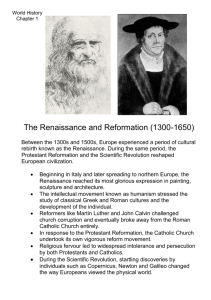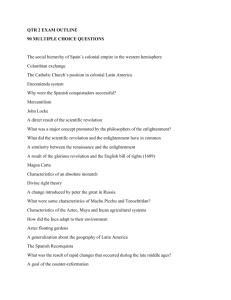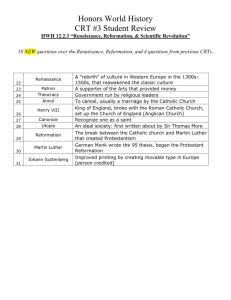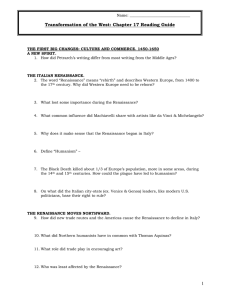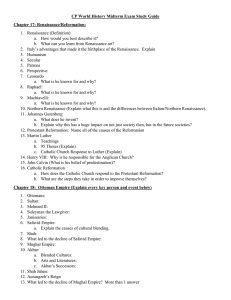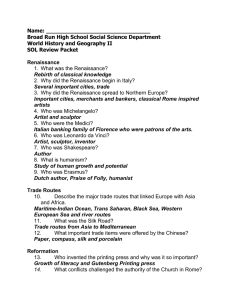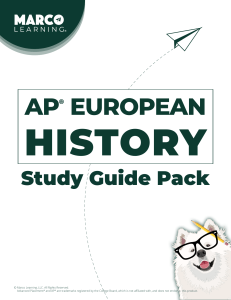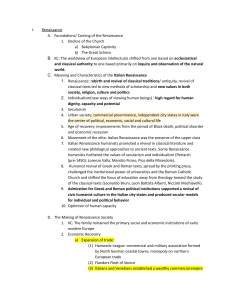Transformation of the West Chapter 17, pgs 368-386
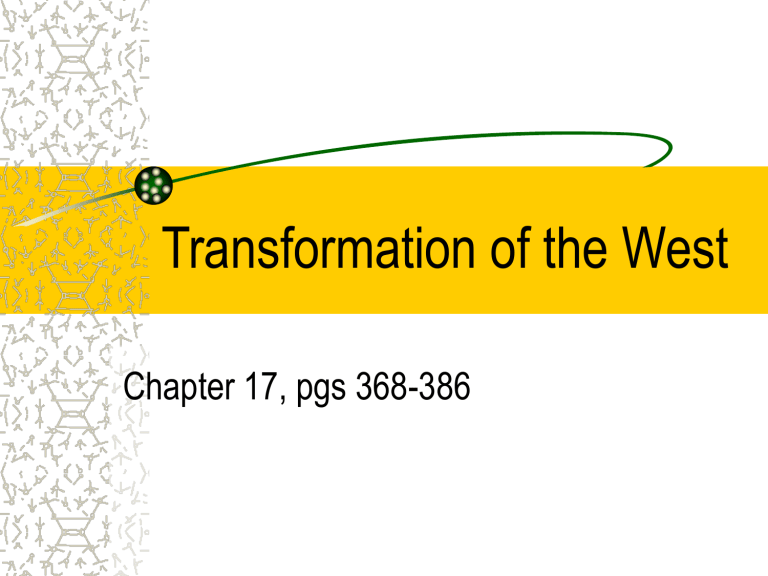
Transformation of the West
Chapter 17, pgs 368-386
Periodization
1300-1450:
Italian Renaissance
1450-1600:
Northern Renaissance,
Reformation,
Commercial Revolution
1600-1700:
Scientific Revolution,
Political change
1700-1800:
Enlightenment
First Changes: Culture & Commerce
A New Spirit
Petrarch – writings of pride & human achievement contrast w/ previous more religious periods
Renaissance
Italy
~urban center, commercial center~
Humanism = focus on humankind
• Examples: Literature, Art, Politics
– Economic effects
– Political effects
1 of 2
Renaissance
Northern Renaissance
~political independence & trade decline in Med~
More religious, but humanism continues
2 of 2
– Political effects
Impact of Renaissance was limited however
Changes in Technology & Family
Contacts spurred new technology
New European-style family emerged
1 of 2
Protestant & Catholic Reformation
Martin Luther challenged the Catholic Church
– Believed faith = salvation
Protestantism was born
– Political appeal
– Peasant appeal
2 of 2
Protestant & Catholic Reformation
After unity breached, other Protestant groups sprang forward
– Anglican: England (Henry VIII)
– Calvinism
Catholic Reformation
– Catholic Church fights back, successfully in S. Europe
End of Christian Unity in West
Effects of Reformation:
– Religious wars
• Some religious pluralism, not liberty
– Political benefits mixed
– Beyond politics
• Less connection b/t god & nature
• Gender relations
• Literacy
Commercial Revolution
New levels of trade
– Caused by world economy & inflation
Colonial markets stimulate manufacturing
Prosperity of commoners improves too
– Average 5x more “things” than SE Europeans
Social Protest
Formation of proletariat
Rising population & food prices hit poor hard
↳
Increased tension b/t rich & poor
Next Changes: Science & Politics
Scientific Revolution
Rise of nation-state
Did Copernicus Copy?
Copernicus = 1 st step in scientific revolution
1 of 2
Science: The New Authority
Examples of scientists who followed Copernicus
– Kepler
– Vesalius
– Galileo
– Harvey
– Bacon
– Descartes
– Newton
– Locke
Science: The New Authority
Impact of scientific revolution:
– Spread of scientific knowledge
– Belief in human control & understanding environment
2 of 2
– Attacks on traditional religious ideas
– Wide assumption about human progress
Science = center of intellectual life for 1 st time
Absolute & Parliamentary Monarchies
– Decline of feudal monarchy = 2 new government forms
1.
Absolute Monarchy
• Example: France
2.
Parliamentary Monarchy
• Example: England
The Nation-State
Governments who increasingly ruled peoples of common culture & language
– Resulted in:
• New loyalties & political bonds
…which resulted in
• Commoners believing gov should act in their interests
…which resulted in
• New functions of gov (like economics)
The West by 1750
Political Patterns
By end of period, political change drawing to close in England & France
Change continued in Prussia however
– Frederick the Great
Warfare b/t nations continued often b/c of rivalry
1 of 2
Enlightenment Thought
Cultural changes as result of applying rational thought to human society
Enlightenment principles =
1. -
2. -
3. -
4. -
Enlightenment Thought
Popularization & changes for ordinary people
– Common exchanges of ideas
2 of 2
– Increasingly wide audiences for findings
– Attitudes toward children changed
– Family hierarchy weakened
Ongoing Change in Commerce
Commerce & consumerism spread to ordinary life
– Agriculture
– Manufacturing
↳
Population explosion
Innovation & Instability
Interconnection of developments is key
Global Connections
Change in Europe = change in view of others
– Backwards, if not uncivilized
